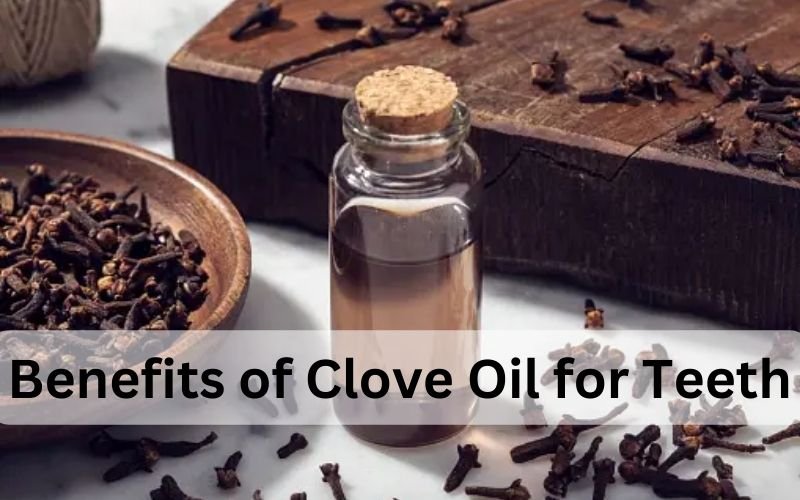Clove oil, a traditional remedy in Indian and Chinese medicine, is renowned for its dental benefits. With its anti-inflammatory, antibacterial, and numerous other properties, it offers temporary relief from toothaches. Eugenol, its primary component, aids in oral hygiene and is used in toothpaste. However, caution is advised due to potential side effects, making it a helpful but complementary treatment for minor dental issues. Clove oil is commonly used in dental care for its natural analgesic properties. Additionally, incorporating clove oil for teeth into your oral hygiene routine can provide added benefits.
Clove oil for teeth, Every person needs to maintain good dental health. Long-lasting teeth make it easier to eat all types of food as you age and your overall health also remains good. However, a large population commonly faces dental problems such as toothache, tooth decay, and bleeding gums and often ignores them until they become highly symptomatic. Toothaches can be too painful and should be treated by a qualified dentist as soon as possible. However, some natural remedies have been tried and tested for decades and can be used at home until dental care is available in an emergency.
Clove Oil and Dental Health

Clove oil is a home remedy used in Indian and Chinese medicine to treat dental problems, primarily toothache. It is also mentioned in Ayurveda. So we wouldn’t be surprised to see clove oil included in toothpaste and other oral care products. There is always a box of cloves in an Indian home along with other spices. Clove is a useful medicine available in the kitchen of our homes. It can be used to a great extent for relief from toothache as it has anti-inflammatory, antibacterial, antifungal, and anti-inflammatory properties. Clove oil contains eugenol, which is the primary component that provides cloves with medicinal properties.
Dentists often use eugenol in dressings in their clinics for problems related to root canal therapy, gums, and abscesses, it is also a major ingredient.
Also Read – How to Cure Mouth Ulcers Fast and Naturally
Clove Oil Benefits
- Provides temporary relief from toothache The eugenol component present in cloves has anti-inflammatory properties that can help a sore tooth
- Cloves contain natural ingredients that can numb the area of skin that comes in close contact with the teeth.
- It is widely used in toothpaste preparations due to its antibacterial and antifungal properties.
How to Use Clove Oil
To get some temporary relief from pain, simply take a clove and bite it on the painful tooth. To get instant relief, soaking a drop of clove oil in cotton and applying it on the affected tooth can also provide instant relief, and it can also be applied to the gums. Judicious use of cloves or clove oil at home can provide relief from minor dental diseases to a great extent. However, care must be taken to apply clove oil in minimal quantities as it has mild side effects as mentioned below.
If used in large amounts and for a long period, cloves and clove oil can harm the surrounding gums and other oral tissues because the chemicals can irritate and sting the oral tissues because they are so thin. And are sensitive. The use of cloves or clove oil in children is not recommended and should be strictly monitored if done.
Use of Clove Oil in Dry Socket
Sometimes after a tooth extraction, removing the healing clot may cause the empty socket area to become infected and cause extreme pain. This condition is called a dry socket. A simple home remedy is to apply two drops of clove oil on the infected area to get temporary relief from pain.
A simple method is to first remove the food debris accumulated in the infected area, then rinse the mouth thoroughly with salt water, and then apply clove oil on the infected area. However one has to be careful with the use of clove oil as it can cause necrosis of tissues.
Also Read – A Guide to Choosing the Best Ointment for Wound Healing.
Use of Clove Oil for Tooth Pain
Toothache is painful and the intensity of pain can vary from person to person. Here, applying clove oil is a simple home remedy to get temporary relief from pain. Many researchers agree that people who use eugenol-based toothpaste have less toothache, inflammation, and other teeth-related problems. So in case of emergency, if you cannot go to the dentist immediately, clove oil can be used locally on the affected area along with some painkillers.
Use of Clove Oil in Gum Disease
Gum disease is a common dental problem that needs to be addressed before it causes more trouble. Gingivitis and periodontitis are common problems associated with gum disease. In the early stages of gum disease, visiting a dentist is the first choice to treat the problem.
However, if you cannot visit the dentist for some reason, applying clove oil may prove helpful in some cases as it has antibacterial properties and helps keep bad bacteria away. Clove oil-based oral products also help in eliminating bad breath due to their antibacterial properties. Clove oil-based oral products also help eliminate bad breath due to their antibacterial properties. As we see Clove lives up to the adage ‘good things come in small packages’.
Also Read – Say Goodbye to Bad Breath 10 Easy Remedies
Conclusion
In conclusion, clove oil offers extremely good blessings for dental fitness. It presents brief relief from toothache due to its anti-inflammatory houses. By numbing the affected place, it reduces soreness. Additionally, its antibacterial and antifungal houses make it a common factor in toothpaste, which aids in oral hygiene. Applying clove oil to gum disease or dry socket may provide brief relief, although it ought to be used with caution due to capacity side outcomes. Although it’s miles no substitute for expert dental care, clove oil serves as a beneficial home cure for minor dental problems. Remember, moderation is prime to averting any damaging outcomes on oral tissues.

